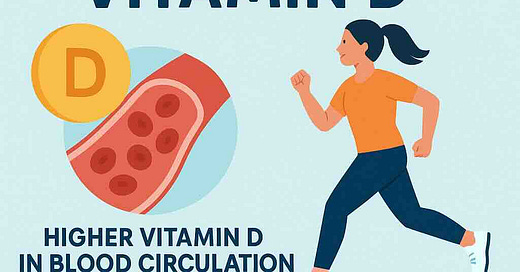This post is based on the recent research published by Dr. Rhonda Patrick. You can enjoy an 8 minute audio version above or the text below.
What is Vitamin D?
Vitamin D is more than just a vitamin; it functions as a steroid hormone influencing over 2,000 genes. Its roles are critical for "brain development, neuroplasticity, and inflammation control," including the clearance of "amyloid beta plaques buildup," boosting "neuron survival via neurotrophic factors like BDNF," and enhancing "brain connectivity."
How Important is Vitamin D for Heart and Cognitive Health?
Vitamin D is positively linked to heart health. Studies suggest that maintaining adequate vitamin D levels may help protect against cardiovascular diseases, potentially reducing the risk of heart attack, stroke, and heart failure. Vitamin D's role in heart health is thought to be related to its anti-inflammatory properties and its influence on the cardiovascular system
Higher vitamin D levels are directly linked to improved cognitive function, increased hippocampal volume, and a reduced risk of Alzheimer's disease. These benefits are particularly evident "when paired with exercise."
What Are the common Causes of Vitamin D Deficiency:
Several factors significantly contribute to widespread vitamin D deficiency:
Limited UVB Exposure: The primary source of vitamin D production is UVB radiation from sunlight.
Sunscreen Use: Sunscreen, even with low SPF, significantly blocks UVB rays, hindering synthesis.
Northern Latitudes and Winter: In higher latitudes, the sun's angle in winter drastically reduces UVB availability, leading to significant drops in vitamin D levels.
Skin Pigmentation: Melanin acts as a natural sunscreen, requiring individuals with darker skin to have considerably longer sun exposure to produce sufficient vitamin D.
Indoor Lifestyles: Modern lifestyles mean most people spend the majority of their time indoors, limiting sun exposure.
Obesity: Obesity is strongly linked to vitamin D deficiency, with obese individuals having nearly double the risk. This is due to fat tissue sequestering vitamin D.
How To Improve Vitamin D Storage and Mobilisation:
Vitamin D is stored in the body's fat tissue. While weight loss can release these stores, exercise can trigger a similar liberation of stored vitamin D, thanks to its ability to mobilize fat.
Exercise Elevates Circulating Vitamin D Levels: Exercise directly boosts circulating levels of vitamin D. A single hour of indoor aerobic exercise can increase circulating levels of active vitamin D by a striking 35%.
Even the major circulating form (25(OH)D) sees a boost of about 10% after a single session. Regular Exercise Prevents Seasonal Decline in Active Vitamin D: A key finding from a recent study highlighted that consistent exercise can completely prevent the seasonal decline in the active form of vitamin D (1,25(OH)₂D₃), particularly during winter. Non-exercisers in the study saw a 15% drop in active vitamin D.
Does Regular Exercise Improves Overall Vitamin D Status?
While both exercisers and non-exercisers experienced a decline in overall vitamin D status (25(OH)D) during winter, exercisers had a significantly smaller decrease (15% drop) compared to non-exercisers (25% drop).
Exercise Optimises Vitamin D Metabolism, Not Just Release: Exercise's benefits go beyond simply releasing stored vitamin D from fat tissue. The research suggests that exercise "actively optimized its metabolism throughout the body," making the body's vitamin D metabolism "more efficient, allowing better utilization of available vitamin D." This is a critical point, as supplementation alone often cannot achieve this effect.
What is the Exercise's Unique Advantage Over Supplementation?
Supplementation can indeed boost vitamin D levels; however, vitamin D supplements don’t significantly impact the levels of circulating 1,25(OH)₂D₃—the active form of vitamin D responsible for its beneficial effects." In contrast, exercise has a significant impact on this active form.
Summary
Regular exercise is not just a way to enhance health and promote longevity—it's essential for our body's ability to regulate hormones, including vitamin D—which is perhaps one of the most powerful hormones due to its ability to regulate nearly all aspects of metabolism, performance, and health. Install our free app
BreathNow to learn easy exercises for heart health and improvement in Vitamin D circulation.














Share this post